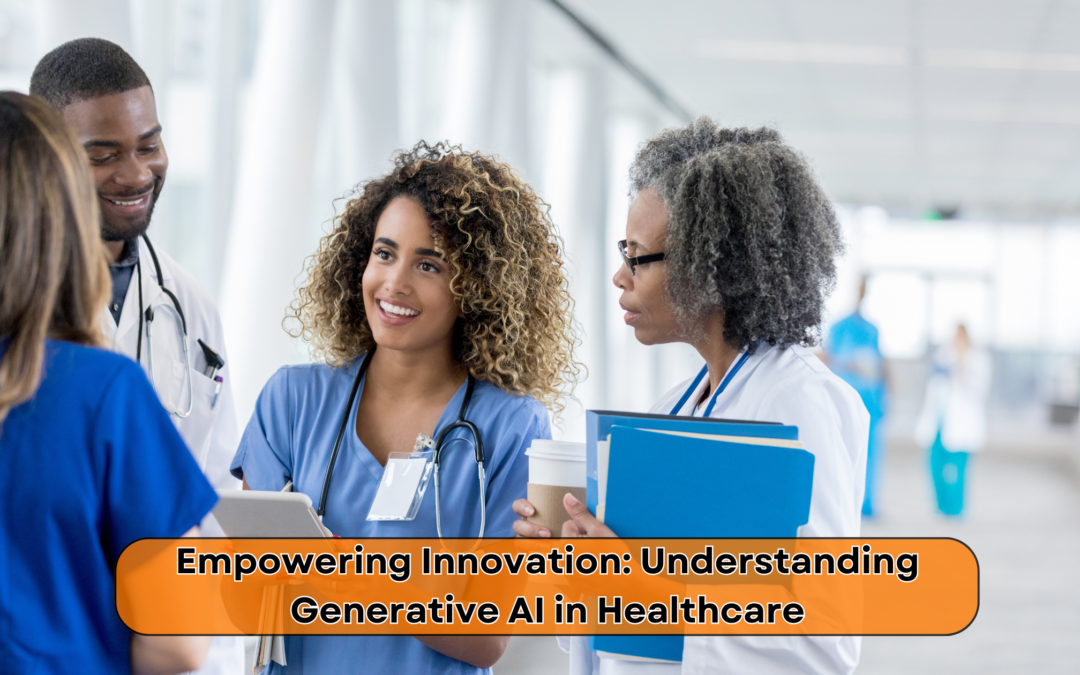Key Takeaways
- Generative AI significantly reduces the time and cost associated with developing new medications by predicting molecular interactions, accelerating the path to discovering treatments for complex diseases.
- By analyzing extensive datasets, generative AI enables the customization of treatment plans to individual genetic profiles and health conditions, enhancing the effectiveness and efficiency of medical care.
- Generative AI improves diagnostic tools and technologies, aiding in the early detection of health issues and providing more accurate interpretations of complex medical data.
- Through innovations like real-time health monitoring, personalized health recommendations, and virtual health assistants, generative AI is making healthcare more accessible, tailored, and patient-centered.
Introduction
By now, it is fair to say that we have long been living in an era of technological intervention; in fact, it sounds so much of a cliché that even saying that has become clichéd. Technology now informs every aspect of our lives, from production to manufacturing to transportation to sales to payments. Oddly enough, healthcare held out for a surprisingly long time, but as the benefits of AI have continued to become apparent, the sector stands out as ripe for innovation. Generative Artificial Intelligence (AI) is spearheading this transformation, promising to revolutionize how we approach everything from drug discovery to diagnosis to patient care. But what is it that makes generative AI a game-changer in healthcare? Let’s step through Alice’s Looking Glass and enter the world of generative AI to explore its potential to reshape the future of medical science and patient well-being.
Unpacking Generative AI
At its core, generative AI refers to algorithms and models that can generate new data instances similar to, but distinct from, what they have been trained on. Unlike traditional AI, which analyzes input to produce a predetermined output, generative AI can create novel content, offering groundbreaking applications in healthcare. To put it in the simplest – and potentially most alarming – language, where AI had already learnt to read, generative AI has now acquired the capability to write, and speak as well.
Generative AI in Action: Healthcare Innovations
Drug Discovery and Development
Generative AI is reducing the time and cost associated with drug discovery. By predicting molecular reactions and efficacy, AI models are shortening the path to new medications, offering hope for treatments for ailments like cancer and rare diseases where standard models of research can be both time-consuming and costly.
Personalized Medicine
Tailoring treatment to individual patients is another area where generative AI shines like a star. By analyzing vast datasets, AI can help in crafting personalized treatment plans that consider the unique genetic makeup and health conditions of each patient, leading to more effective and efficient care.
Enhancing Diagnostic Accuracy
The accuracy of diagnoses is vital for effective treatment. Generative AI assists in improving diagnostic tools, from imaging technologies that can detect anomalies earlier than was possible before, to algorithms that help in interpreting complex medical data, thereby enhancing the precision of diagnoses.
Revolutionizing Patient Care and Experience
Beyond diagnostics and treatment, generative AI is transforming patient care through real-time monitoring systems, personalized health recommendations, and even in creating virtual health assistants, making healthcare more accessible and personalized than ever.
Navigating Challenges and Ethical Considerations
Despite its potential, the integration of generative AI in healthcare comes with a unique set of challenges and ethical considerations. Data privacy, the potential for bias, and the need for clear ethical guidelines are among the rivers that need to be crossed. Ensuring the security of patient data and navigating the moral implications of AI-based decisions are crucial steps in leveraging AI responsibly.
The Future is Now: Embracing AI in Healthcare
The integration of generative AI into healthcare systems and practice is an ongoing process. Emerging trends, such as AI in mental health therapy or in robotic surgeries, hint at a future where AI will be an integral part of healthcare. This future demands that there be close and effective collaboration among tech innovators, healthcare professionals and policymakers to create a system that continues to beinnovative while remaining ethical.
Conclusion
Generative AI represents a frontier of opportunities in healthcare, offering the promise of more personalized, efficient, and innovative care. As we navigate its challenges and promises, the final goal remains clear: to harness AI’s power to make healthcare more accessible, effective, and personalized. The journey of integrating AI into healthcare is just beginning, and it’s an exciting time to be part of this transformative movement.
MarkiTech has various subsidiaries with products and services targeted towards digital healthcare and telehealth/telemedicine and virtual clinics with a laser focus on helping seniors age in place and help their caregivers.
Sensights.ai is a company focused on remote patient monitoring and aging solutions, which utilizes artificial intelligence to track the health of patients and keep a round-the-clock connection between caregivers and patients.
As well, Veyetals uses PPG and AI modeling algorithms to capture the light reflected by the blood vessels under a patient’s skin to measure vitals anytime, anywhere.
Lastly, we have now launched our latest Mental Health AI Scribe tool called CliniScripts.com




Recent Comments